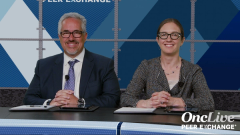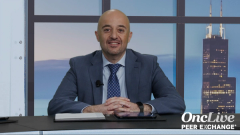
Efficacy and Safety of JAK Inhibitors for Myelofibrosis
Jamile Shammo, MD, FACP, explains the efficacy and safety of the 3 approved therapies for myelofibrosis.
Episodes in this series

Rami Komrokji, MD: Jamile, because we have several of those drugs now, walk us through how you assess the efficacy and safety of those drugs. How do you monitor those patients when you start? What are the things you use in practice? I don’t think we repeat MRIs to look at 35% spleen volume reduction every 3 months. How do you assess the efficacy in practice? What are the key safety issues that you look at?
Jamile Shammo, MD, FACP, FASCP: Before we start treating someone, we have to be comfortable with the adverse effect profile of the drug that you’re choosing. An important piece is to prepare the patient for the type of adverse effect that they’re about to face. When I’m starting somebody on a new agent, I tend to monitor their counts very frequently. In the case of ruxolitinib, you know that there’s going to be erythrogenically induced anemia 6 or 8 to 12 weeks after initiation, along with thrombocytopenia, so you want to prepare the patient for it. The patient has to be willing to accept this, provided that they’re going to feel better. They’re going to have their spleen shrink, and they’re ultimately going to put on some weight. That’s the price you pay for this.
In the beginning, it tends to be a little more intense. Later, once you arrive at the right dose, having determined what the patient will tolerate based on their counts and the monitoring that you’ve done, then it would be much less frequent. I typically don’t do imaging. I rely on my physical exam for the spleen. I educate the patient in terms of what they need to call me about, such as herpes zoster infection. I assess their risk in terms of zoster infection. I might opt to put people on a prophylactic dosing if they’ve had a history of zoster infection prior to starting.
The other piece is what you choose in someone who may have a platelet count below 100,000 per mm3. Am I going with ruxolitinib? Is fedratinib a possibility? The trials with fedratinib included patients who had platelet counts down to 50,000 per mm3, so that’s another issue. In someone who may have nutritional issues and in whom you’re concerned about thiamine, if you’re considering starting fedratinib, you need to check that level and monitor it moving forward. I’m aware of people who may supplement thiamine instead of worrying about testing the level because it’s much easier to do so than waiting a week to get the results back. That’s a reasonable thing to do.
As you’re monitoring those patients moving forward, it’s essential to monitor for signs of progression. Once in the clinic, a patient came back and said, “I was feeling fine. I had no issues, and now I have pain on my side.” Obviously, any change in symptoms should prompt an evaluation. At that time, I did a physical examination, but imaging wouldn’t be unreasonable at that point because any change in symptoms, new splenomegaly, or perhaps cytopenias that aren’t helped by dose modification should prompt an evaluation for disease progression and perhaps consideration for a change of therapy.
Rami Komrokji, MD: Absolutely. Obviously, the common theme is myelosuppression—maybe to a lesser extent with pacritinib and fedratinib—so we monitor up front. As you mentioned, with fedratinib and pacritinib, GI [gastrointestinal] toxicity because they had FLT3 inhibitor, and obviously the rare infections, I wouldn’t worry about the long term. When patients are responding, I also bring up the point—particularly with the ruxolitinib—that if they get sick or are hospitalized, they shouldn’t stop the treatment suddenly, because they’ll have rebound of their symptoms. People in the past tried to publish about this…even with stopping it. When those patients are sick, I try to keep them on ruxolitinib or bridge them to steroids, so that’s something to keep in mind. Don’t stop those drugs abruptly when they’re sick.
Transcript edited for clarity.







































